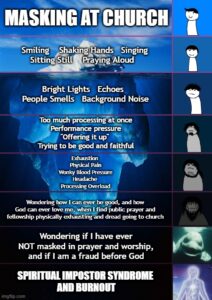This post originally appeared on the Mission of Saint Thorlak website in 2019, but serves as a very good capstone on Autism Awareness Month, particularly as it so eloquently describes our vision for the Autism Consecrated community. – Aimee
Towards a Spirituality of Autistic Life
by Father Mark P. Nolette
The stone which the builders rejected has become the cornerstone. By the Lord has this been done; it is wonderful in our eyes. – Psalm 118:22-23
A thorn in the flesh was given to me, an angel of Satan, to beat me, to keep me from being too elated. Three times I begged the Lord about this, that it might leave me, but he said to me, “My grace is sufficient for you, for power is made perfect in weakness.” I will rather boast most gladly of my weaknesses, in order that the power of Christ may dwell with me. – 2 Corinthians 12:7-9
Consider your own calling, brothers and sisters. Not many of you were wise by human standards, not many were powerful, not many were of noble birth. Rather, God chose the foolish of the world to shame the wise, and God chose the weak of the world to shame the strong, and God chose the lowly and despised of the world, those who count for nothing, to reduce to nothing those who are something, so that no human being might boast before God. – 1 Corinthians 1: 26-29
What does it mean to be Catholic and autistic? How can autistic people encounter the Lord in their lives? What do autistic Catholics offer to the rest of the Church, to the entire Body of Christ? How does an autistic person exist in the image and likeness of God? Can God have an autistic face? If so, what might such a face look like?
First of all, let us recall that autistic people remain human beings. Autistic people are also sinners in need of redemption. We need the grace, reconciliation and salvation that is found in Christ through His Church. We need to be incorporated into the very life of the Triune God. We need the Church. We need the Sacraments. We need prayer. We need the example and the inspiration of the saints, both past and present. We need to live lives of committed, faithful, just and persevering love. In all these ways, we are the same as all other people.
Yet, we are not quite the same. We are on the autism spectrum. For some of us, it may be more obvious than for others. Nevertheless, for all of us on the spectrum, autism is a reality that permeates every aspect of our lives. Autism is a way of being in the world, or perceiving the world, and of responding to the world that makes us “different”. Not better or worse; simply different. We would then expect that our life of faith – the way that we as autistic people encounter God and respond to God – will be at least somewhat different than that of others because of our autism. Not different in the sense that we experience things that no one else experiences at all. Different in the sense that certain experiences that are present in the lives of most people – at least to a limited extent – are far more prominent in our lives because we are autistic.
Think of these examples. Everyone deals with other people, but only certain people are very social and choose a calling that requires such a social nature. Everyone is alone – or needs to be alone – now and then, but only certain people choose to live alone as something essential to their calling. It is the same with us as autistic people when we see ourselves in the midst of humanity as a whole.
What does it mean to be autistic? If we look to the DSM-5 under “Autism Spectrum Disorder “ (note the term ‘disorder’), we will find a description of various characteristics. Intense special interests. A strong sense of being apart from others. A love of routine and of ritualized behavior, and a hatred of change. Difficulties with empathy. And so on.
Note that all of these characteristics are considered abnormal and therefore pathological. They are seen as weaknesses, as expressions of a disturbance or disorder, as symptoms that something is not right with us. To be different from the vast majority of other people makes us somehow disordered, pathological, psychologically unwell. That’s the unspoken implication of the way that all the behaviors that set us apart as autistic are described.
Now, it is possible that any or all of these behaviors could become pathological. This can happen if we do not know or accept that we are autistic, and do not understand why we do what we do or respond as we do. This can happen if others have somehow abused us or taken advantage of us. This can happen if we find ourselves in a life situation that is simply too much for us as autistic people. But – and this is a BIG but – autistic behaviors need not be pathological. As Tony Attwood noted in his book on Asperger’s Syndrome, if you leave an autistic person alone – or pair that person with someone who shares one of his/her intense interests – there is no sign of pathology at all. None of our autistic behaviors need be pathological or bad or destructive. In fact, it is my contention that every one of them can become a way for us to encounter the Lord, and for others to encounter the Lord in us. Yes, that which has marked us off as unlike others, or inferior to others, can become the cornerstone on which the Lord builds His grace in our lives.
Accordingly, I will now explore several experiences or behaviors that are characteristic of us as autistic people, and show how each one has a definite parallel in the story of God’s relationship to His People throughout the Scriptures and the history of the Church. This will help us, as autistic people, to reframe these experiences and behaviors as encounters with God, and it will help those who are not autistic to see how autistic people, by their very presence in the Church, are reminders to the whole People of God of some fundamental truths about God and about what it means to belong to God in His Church.
1) The Experience of Otherness
We autistic people – even before we know ourselves as autistic – experience ourselves as ‘other’, as different in some definite but almost inexpressible way from other people. There is often a profound sense of being disconnected from other people. We may want to connect with others or fit in now and then, but may have no clue how to do so. Looking at other people, we may feel like anthropologists studying some newly-discovered primitive tribe. (What are they doing? Why are they doing that?) Usually, we are content to be alone, even though we value our friends and want to be with them from time to time. Even among friends, however, we feel ‘other’; we feel different. Others tell us that we are different, and that is rarely said as a compliment. We feel misunderstood, isolated, alone. If we do not understand what this sense of ‘otherness’ can point to in a positive sense, we will end up seeing it as a negative reflection on ourselves. We then feel hopelessly flawed, or hopelessly unseen.
Can we find an experience of otherness in our Catholic tradition? Definitely! From the very beginning, God is called holy. We usually associate holiness with great goodness, but that was not the original meaning of ‘holy’. ‘Holy’ meant ‘other’. “I am God and not man, the Holy One in your midst.” God was seen as the Radically Other. God was not like anything else we could know in our world. God is Other. If God is holy in the sense of being Other, then His People must also be Holy. They must be Other. They cannot be like the nations that are all around. Here is where the sense of holiness as goodness enters the picture. We are Other as God’s people. Therefore, we cannot live like everyone else. No, we must live according to God’s ways. This sense of God as Holy, as Other, and the sense of God’s People as also Holy and Other, is found in both Old and New Testaments.
In this light, we can say that one important reason why we as autistic people, because of our unusual sensitivities, feel like we are ‘other’ is because we have an unconscious sense of the presence of God who is Other. Moreover, our presence among the people of God is meant to remind them that they, too, must be ‘other’. They cannot live like everyone else does. They belong to God, who is Other. Their lives need to be in harmony with the ways of God, which are not necessarily the ways of nations and cultures. This is not a popular message in a society that claims to honor diversity but demands uniformity. Followers of Christ must be different. We must be Other. We autistic people help remind our sisters and brothers of this.
2) Repetitive Behaviors/Love Of Routines/Hatred of Change
We autistic people tend to like doing things in a certain way. We usually like to have things in certain places, and to follow certain routines. The unexpected can be very hard on us. It takes time and effort to adapt to any change. We may soothe ourselves with repetitive motions. In a society that values newness and change, such behaviors and attitudes appear as problems. Other people cannot understand why we act as we do, or why change is so painful for us. They only see it negatively.
Can our Catholic tradition enlighten us? Yes. We have already spoken of the holiness of God in our tradition. How do people respond in the presence of the Holy? In the Old Testament, they did special washings, they followed certain rules, and they maintained a certain distance between the Ark of the Covenant (which symbolized God’s presence) and everyone else. In the New Testament and in the Church since then, we have liturgies, sacraments, and various styles of prayer. In other words, we have established routines, repetitive behaviors that rarely change, when we are in the presence of the Holy. That’s what liturgy is. That’s what ritual is. That’s how people have instinctively responded to the presence of the Holy for thousands of years. That’s how we as Catholic Christians respond to the Holy among us now.
In this light, we can say that our routines and repetitive behaviors – though they do soothe us – may also flow from an unconscious or subconscious sense of the presence of the Holy, of God, among us. We can see them as reminders that we are in God’s presence always. Other people, who are not autistic, can learn to see these behaviors as reminders that they, too, are always in the presence of the Holy – God – no matter where they are or what they do.
3) Special Interests
We autistic people, from our earliest memories, have had a sense of otherness, of separation from people in general and the world around us. We perceive ourselves as unique in ways we cannot define or express. This sense of otherness would appear to lead us into the direction of total isolation. But then, something draws our attention. Something that attracts and fascinates us. This thing becomes the first breach in our isolation, a crack through which the beauty of the world first captures our notice and through which our wonder and awe first pour forth. This is not obsessive. This is falling in love with the beauty of reality. The thing that enraptures us could be something generic, like dinosaurs, or something more specific, like a specific part of a vacuum cleaner. To others who do not share this love, our focus seems excessive and obsessive. To us, it is sheer delight. Our greatest act of love is to share it with someone else. Here is where we first learn to love.
Can our Catholic tradition say something about this? Yes, indeed. We have something called the doctrine of election (and I’m not referring to voting). It means that, out of all the peoples of the world, God chose a people – Israel – for Himself. Not because Israel was better in any way, nor because God hated other nations, but because God wanted one people to come to know Him, to witness to Him, and to be the means through which all the nations of the world would find the blessing of faith in Him. This sense of election continues in the New Testament and beyond. Those who become members of Christ’s Body, the Church, are the new Israel, the new People of God. We are chosen, not because we are better than others in any way, but for God’s own purposes: that we might witness to the world through our lives the Gospel given us by Our Lord Jesus Christ, especially in His Passion, Death and Resurrection. We are the “breach”, so to speak, through which Christ can pour forth His love and grace into a wounded world.
In this light, we can say the following. First of all, we autistic people can think of our special interests – whatever they are – and tell ourselves, “I am one of God’s special interests. God loves me even more than I love my favorite things!” Secondly, our special interests remind others that they, too, are chosen by God to be a part of His Church and that they are loved even more than we autistic people love our interests (and that’s saying something). Thirdly, our special interests are really a training ground for love. In first learning to love one thing, we begin to learn how to love other people and God as well.
4) Empathy
We autistic people run into a serious misunderstanding on the part of other people when it comes to empathy. Because we may have difficulty knowing what we feel, let alone expressing it, people may assume that we do not feel for others. The problem here is that people do not realize that there are two kinds of empathy, as Simon Baron Cohen points out in his work: cognitive empathy and affective empathy. Cognitive empathy is the ability to “read” another person and understand what that person is feeling. With autistic people, cognitive empathy is impaired or even absent. We usually have a very difficult time in reading someone else’s feelings, until we learn to do so after many years of life. Affective empathy is the ability to care about how the other person is feeling. Some studies suggest that autistic people often have a high degree of affective empathy, even if they cannot always demonstrate it well to others. If we are told that someone feels upset or hurt, we will feel upset or hurt.
Combine this with the autistic person’s usual sense of otherness or isolation, and something interesting begins to emerge. If an autistic person acts on his/her feelings of affective empathy, that person is not likely to feel much affirmation for that act of love. This is partly due to the autistic person’s sense of isolation, and partly due to how difficult it is for the autistic person to express feelings or other inner motivations. For example, here is a story about a young autistic man who began to serve at a homeless shelter and soup kitchen. Some of the homeless people accused him of being “a bad man” because he did not seem warm like the other volunteers. Stories like this one suggest that, whenever an autistic person chooses to love, that love (if it is to last) will become an unconditional love very quickly. The young man had very little feedback or praise, and lots of questions in his own mind. But he believed that this ministry was what God was calling him to do, and that was enough. If that isn’t unconditional love, I have never seen it.
Here we get to the very core of our Catholic tradition. Our faith tells us that God is love. But what kind of love? A total, selfless, unconditional love. A love that seeks a response, to be sure. Nevertheless, an unconditional love. We have St. Paul’s meditation on love in 1 Corinthians 13. We have St. Paul writing to the Philippians about how Christ emptied Himself, took the form of a slave, and died on the Cross out of love for us. We have numerous other witnesses to this love – not to mention countless saints who incarnated this Love in their lives, each in their own way.
In this light, we autistic people can see our affective empathy, and the misunderstandings we may encounter as we try to serve others, as an invitation from Our Lord to love as He loves, to have His love dwell in our hearts in all its fullness. People who are not autistic, but who understand that we are, will see in us a model of disinterested love, a love that gets nothing out of it, but loves for love’s own sake. Is this not the kind of love most needed in our world now?
Now that you’re warmed up, see if you can go on from here. Think of some characteristic of autistic people that I have not mentioned here. Does it remind you of anything you have ever read in Scripture or learned about your faith? See if you can make a connection like I have here.
It is my hope that these few words will help people both on and off the spectrum to see autistic people in a different light. God often chooses those whom the world dismisses and works His wonders in and through them. Autistic people are among God’s little ones. Let no one tell you otherwise.






